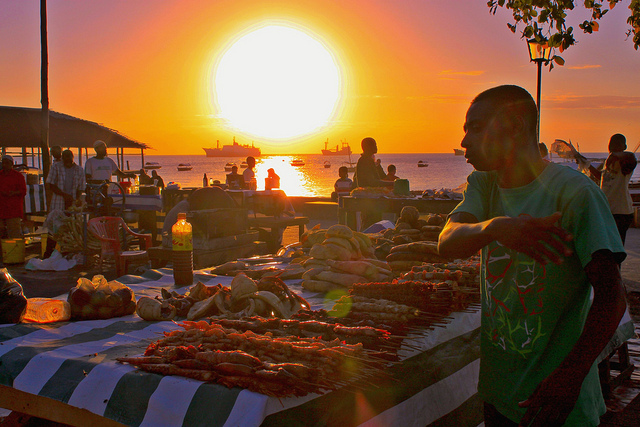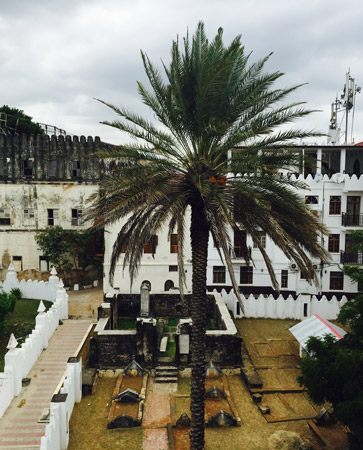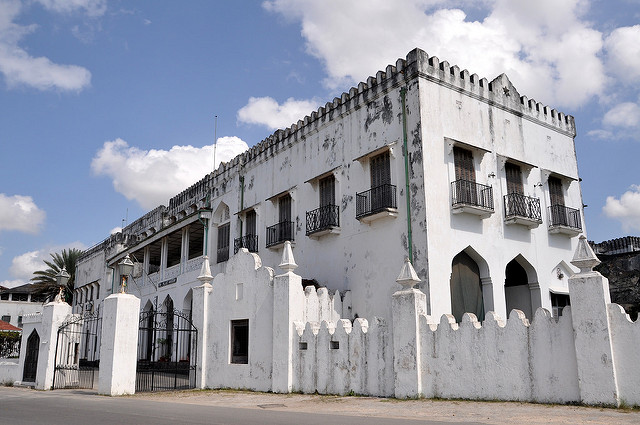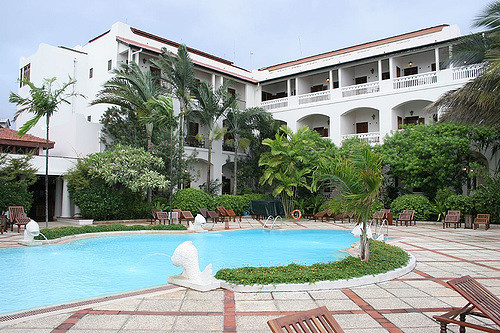

A Little About Zanzibar
Zanzibar. For me the very name stirs feelings of adventure and mystery and conjures up visions of waterfront palaces of Sultans and the labyrinth of narrow lanes weaving through Stone Town filled with exotic sights, smells and sounds.
I was not disappointed when I finally arrived on this small island in the Indian Ocean.

Officially part of Tanzania, Zanzibar lies only 20 miles off mainland Africa but is a world apart in atmosphere.
Here, African, Indian and Arabian cultures come together in Stone Town, a maze of narrow streets that has been named a UNESCO World Heritage Site because of its architecture which reflects centuries of sea trade between Africa and Asia.
Once known as Spice Island for its export of cloves, many travel to Zanzibar today for its natural beauty and unique culture.
The City Market in Zanzibar
The Indo-Arabian architecture of the old Stone Town building housing the City Market is the perfect exotic backdrop for huge mounds of luscious fruit, fish caught only moments earlier squirming across the stone floor, while men sit playing bao, a traditional board game, and women in their bui bui, Islamic coveralls, shop and pause to chat.
The sights, smells and sounds are intoxicating and I could have spent the entire morning wandering through the market, bargaining for fresh fruit and sampling cooked on the spot shrimp, but the mystery of Stone Town drew me out into its narrow streets.

Passing large carved doorways concealing opulent courtyards – browsing through shops and stalls selling local crafts, African jewelry and ebony carvings.
It is representing shetani, spirits that take on animal or human forms in Zanzibari witchcraft (Zanzibar is a renowned center of voodoo) – I made my way to the site of the Great Slave Market.

Great Slave Market in Zanzibar
Arab slave traders made Zanzibar the hub of slave trade in all of East Africa. On the site of their old market a beautiful monument has been built in honor of the decree by the Sultan of Zanzibar on June 6, 1873.
It stopped the slave trade in Zanzibar, thus ending a dark time in its history. The underground chambers still remind visitors that men, women and children were held here before they were sold on the market.
There is a pulsating feeling of lingering ghosts in the shadowy chambers with patches of sunlight filtering in through narrow windows to warm the cold stone floor.
Newly intrigued by the Omani Sultans of Zanzibar, I made my way to the Palace, now a museum. The last Sultan ruled prior to the 1964 revolution and there are many relics of the family life they lived while in power.
The staircases creak under my feet as I explore the top floors and there is a soft swoosh of fans cooling the high ceiled rooms crammed with large paintings of past Sultans and one particularly beautiful portrait of Queen Elizabeth II as a young woman when she visited with Prince Philip.
The Palace/Museum staff are delighted to talk about the times of the sultans and about the virtues of life in Zanzibar with its peaceful union of so many different cultures.
Best Indian Restaurant in Zanzibar
From one docent, I get a recommendation for the best Indian Restaurant in all of Zanzibar.

When I travel I enjoy meeting and talking to the locals who are always eager to help guide me to their favorite haunts.
The docent’s directions to Silk Route takes me through the streets of Stone Town to the end of Shangani Street, around a deep curve to an arched doorway with a small wooden sign swinging gently in a welcome breeze. Three flights of white washed steps loom in front of me.
At the second landing I am greeted with a cool towel and told to proceed to the third floor restaurant.
It is a large white room with arched windows cut into stone and through which the Indian Ocean glistens bright blue in the powerful sunlight. There is a murmur of several languages being spoken above the whirl of overhead fans.

Without requesting it, I am given the best available table in front of an open window. Through it, I have a view over the rooftops to the ocean where several traditional wooden dhow boats plow through the waves.
The owner comes to greet me and makes recommendations from the large menu. I choose my favorites, Butter Chicken and cheese naan.
It is perfectly seasoned and as delicious as I had been told. So much so, I splurge and order a second order of naan and add their homemade chutney.
When I compliment the chef and bid all a farewell they suggest I stop for a drink at their most famous hotel, Zanzibar Serena, located a short distance away.

Half way down Shangani Street, I enter the historical stone building which is the exotic world of the Zanzibar Serena Hotel.
From the turbaned doorman to the beautifully carved wooden doorways and lattice work to the tiled floors, it is exactly what I hoped to find in a hotel in Zanzibar.
The air is perfumed as an elegant graceful hostess leads me through the arched ceiled hallways to the quiet bar open to the white coral sand beach and the Indian Ocean.
While sipping perfectly chilled champagne, I gaze out at remnants of coral stone walls glowing amber in the late afternoon sunlight.
Not only did Zanzibar not disappoint, it has made my list of favorite places I have found on my travels. I’ll be back.
If You Travel to Zanzibar
Zanzibar Serena Hotel
Shangani Street
Zanzibar, Tanzania
[email protected]
serenahotels.com
Author Bio: Sherrill Bodine is an author, fashionista, and world traveler. She has published over a dozen romance novels, co-wrote a comic book, and was a contributing columnist to the Chicago Sun-Times.
- How to Renew a US Passport Quickly and Affordably - April 19, 2024
- 6 Reasons to Visit Portland, Maine (+ Travel Tips) - April 18, 2024
- Cruising with Discovery Princess on the Mexican Riviera - March 30, 2024
